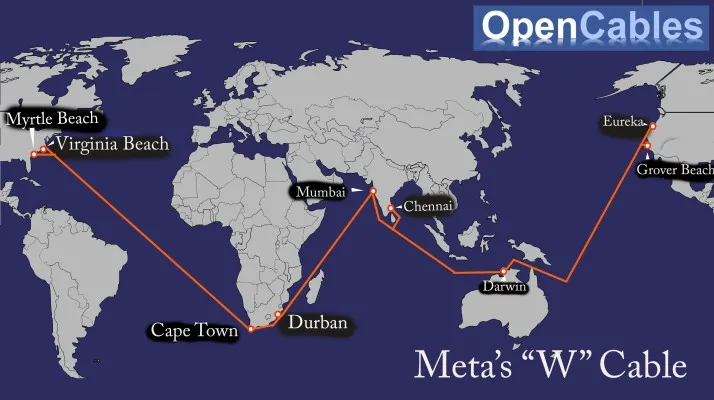Our Terms & Conditions | Our Privacy Policy
Meta Plans $10B Subsea Cable Project Spanning the Globe
Overview of Meta’s Subsea Cable Plans
Meta, the parent company of Facebook, Instagram, and WhatsApp, is planning to construct a massive 40,000+ kilometer subsea cable project. Estimated to cost over $10 billion, this cable would be entirely owned and operated by Meta, marking a significant shift in its infrastructure strategy.
Scope and Vision
- Route: A global “W” pattern spanning the U.S. East Coast to India via South Africa, and from India to the U.S. West Coast via Australia.
- Initial Budget: $2 billion, expected to exceed $10 billion as the project progresses.
- Ownership: This will be Meta’s first wholly owned subsea cable, distinguishing it from previous shared investments like the 2Africa cable.
Timeline and Challenges
- The project is in its early stages, with no physical work started yet.
- Limited global resources for subsea cable construction, such as cable-laying ships, may delay progress.
- Likely built in phases due to logistical constraints.
Why Meta Wants Its Own Cable
Enhanced Infrastructure for Data Traffic
Meta’s platforms account for a significant share of global internet traffic (10% fixed, 22% mobile). Sole ownership ensures reliable infrastructure for:
- Supporting data-heavy services like video and AI tools.
- Prioritizing Meta’s traffic over shared infrastructure.
Geopolitical Considerations
- The route avoids high-risk geopolitical zones like the Red Sea, South China Sea, and the Straits of Malacca, reducing vulnerabilities to warfare-related disruptions.
- Ownership provides Meta with greater control amidst rising concerns over subsea cable security.
Supporting AI Development in India
- India’s potential as a hub for AI training and data center expansion aligns with Meta’s subsea plans.
- The cable could support AI model training by leveraging India’s lower compute costs and growing data center infrastructure.
Competitive Landscape
Meta joins other tech giants in investing in subsea cables:
- Google: Sole owner of several subsea routes; involved in 33 networks overall.
- Amazon & Microsoft: Part-owners or capacity buyers but lack wholly owned routes.
Broader Implications
Economic Contributions
Meta claims subsea investments boost regional economies significantly. For example:
- Projects in Europe and Southeast Asia reportedly contributed over $500 billion to local economies.
Shift in Subsea Cable Ownership
- Traditional telecom consortiums are losing dominance to tech giants like Meta and Google.
- Direct ownership allows tech companies to optimize infrastructure for their own needs.
Potential for Broader Use
While Meta has not confirmed if the cable will serve external users, this remains a possibility as the project evolves.
Conclusion
Meta’s ambitious subsea cable project reflects its commitment to securing its infrastructure, expanding its global reach, and supporting AI innovation. If successful, the cable could solidify Meta’s position as a leader in global tech infrastructure while transforming how data is delivered worldwide.
For more updates check out our Instagram handle.
Images are for reference only.Images and contents gathered automatic from google or 3rd party sources.All rights on the images and contents are with their legal original owners.



Comments are closed.